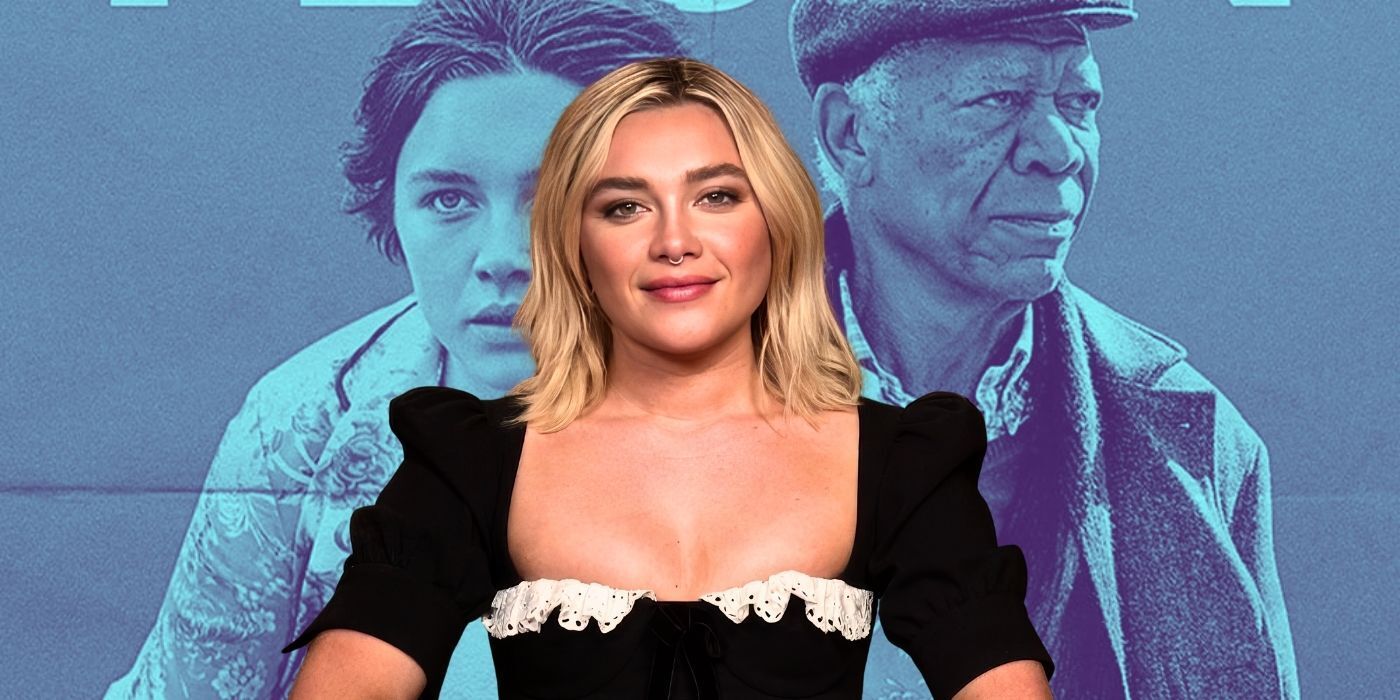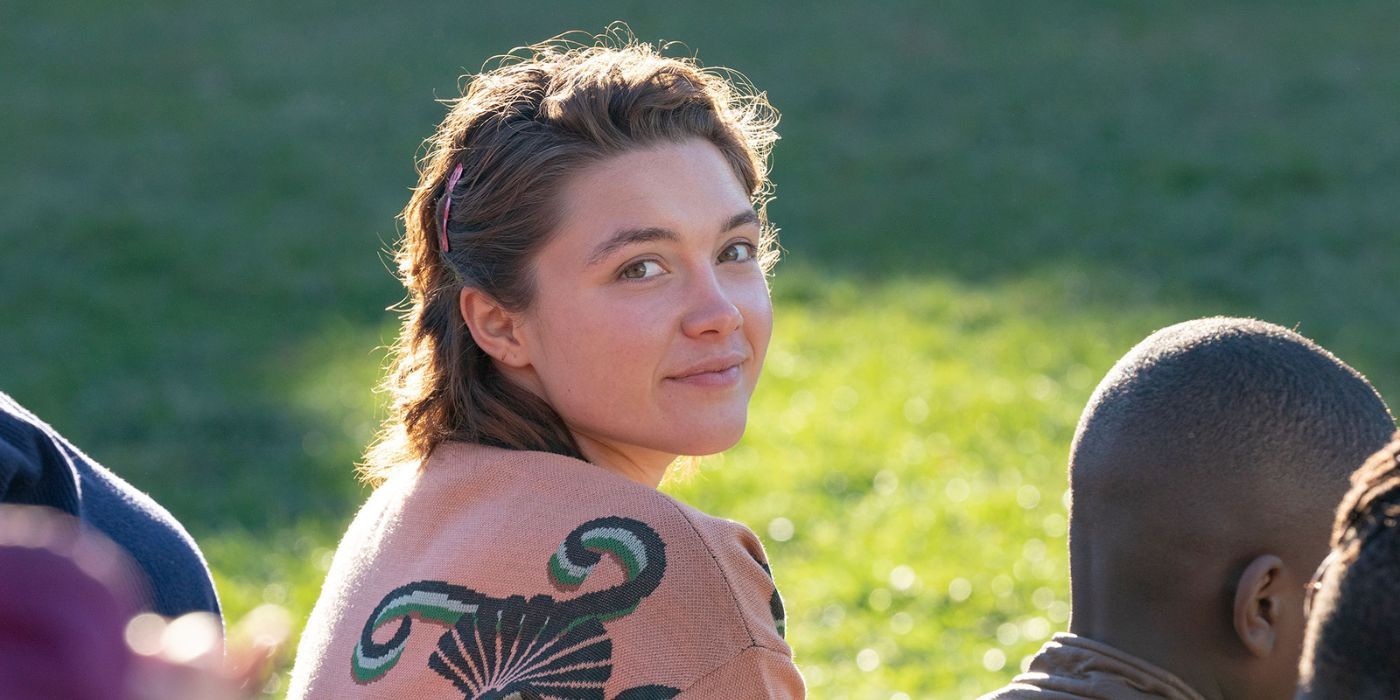In the next couple of years, Florence Pugh will be delivering huge strides in blockbusters like Christopher Nolan's Oppenheimer, the much anticipated Dune: Part Two, and reprising her role as Yelena Belova in the MCU's Thunderbolts in 2024. Always a standout in her performances, writer-director Zach Braff commented in a previous interview with Collider that her work in MGM’s A Good Person is “unbelievable.” In the film, Pugh plays Allison, opposite co-stars Morgan Freeman and Molly Shannon, who is a woman struggling to overcome an opiate addiction in the aftermath of a terrible tragedy. The fatal accident not only upends her otherwise successful trajectory and causes an irreparable rift in her engagement, but sends Allison down a dark path. Ahead of its theatrical premiere on March 24, our own Steve Weintraub was able to speak with Pugh about taking on a role that requires incredible sensitivity and respect.
During their conversation, Pugh explains why it was crucial to do in-depth research on the topic of addiction, and the emotional and physical toll it takes on a person, in order to understand the struggles Allison is going through in the film. She discusses with us why a short shoot and a small budget provide her with an ideal workflow, which idea she brought to A Good Person that helped her find Allison’s character, and shared a little about her experience on the set of Dune: Part Two. You can watch the interview in the player above, or read the full conversation below.
COLLIDER: I really want to start with a sincere congrats. I thought you did such great work in this.
FLORENCE PUGH: Thank you very much. Thank you, that's very kind.
You've done some really cool work the last few years, and I'm curious if someone's actually never seen anything you've done before what is the first thing you'd like them watching and why?
PUGH: That's a good question. Well, I don't want to scare them off, you know? Like, I don't want them to not be intrigued about the others, so I think a good light one that is fun and enjoyable, and shows just how bizarre my choices are, would probably be– I'd start them with Fighting with My Family.
Yeah, that's also quite good.
PUGH: Yeah, I think it's a good one that people can laugh at and be like, “Oh, it's interesting.”
Jumping into why I get to talk to you, trying to depict addiction on screen and make it realistic, it can be the third rail because if it's not real, this is a disaster. So I'm curious, was there any hesitation on your part in playing this role? Because it's going to require a lot out of you, and if it doesn't work it's real bad.
PUGH: Yeah, you're right. If it doesn't work, it's offensive. It's disrespectful. It's embarrassing. It's all the awful things that an actor, performer, or director never wants to feel. I think that's why it is so crucial that we did deep, deep, deep diving, and deep background checks on what it is that these people are going through. You can't make a movie like this with this topic and this unbelievably sensitive and delicate storyline without doing our research, and without talking to the right people, and that's just something that, you know, it was obvious that you need to do.
For me as an actor, I need to get into the physicalities of the character. That's how I kind of get into who they are and how they walk and how they hold themselves. And especially for someone battling an opiate addiction. I needed to understand the drug. I needed to understand how it makes people feel when they have it, when they don't have it, how it affects your life in all the positive and negative ways. And so, that was something that I took very seriously. And understanding the pain, the sheer physical pain that you are actually in. You need this thing, and if you have this thing everything is fixed, and you feel better, and everything up until that point of having it is agony, sheer pain, your skin is itching. You are absolutely ill, and the one thing that can save you is this little thing.
And so for me, yeah, I asked a lot of questions and practiced the physicality. And I think, also, just one more thing regarding recovery, it's not one clean, easy line of like, “Oh, you get to rock bottom and then you fix yourself,” or, “Oh, you're here and then you get worse.” It's a roller coaster. It's up, it's down, there are peaks, there are troughs. It's never obvious what's going to happen next, and I think that's just so important to highlight, and especially in our movie, I think we do a good job of it is, that you don't know which way it's gonna go and that's why it's so hard to overcome.
Yeah, I've known people with addiction issues and there's a line in the film where Zoe [Lister-Jones] says to you, “There are people that have made it and there are other people that have died,” and it's very, very accurate. When you were looking at the schedule, and you saw everything you had to do, what was the day you had circled like, “Oh, this is gonna be a really bad day.”?
PUGH: Never.
Oh, really?
PUGH: Never. I thrive under pressure, and I love being put to the test, and I completely come alive when we are telling a story in a short amount of time. I love a short shoot. I find it exhilarating and thrilling, and everybody is so focused because we need to get it done. And you know, this is how I grew up in the industry, this is how I learned, was small indies with not a lot of time, tiny budget, an amazing cast, and a fantastic crew, and you've just got to make it work. And I think for me, I love the aspect of filmmaking. There's nowhere to hide. There's no day that you can figure something out. If you don't get it, you lose it from the movie, and that's how I learn. I really like stepping up to the challenge with these kinds of movies.
What was it like filming the cutting of your hair because you obviously have like one take to get it?
PUGH: I was so excited. I was so excited. It was an idea I had that I wanted us to meet her a year later and her be a completely changed person, and her actually willingly chopping that piece of herself off. I was so pumped. I was so excited to chop it because then I really felt like I could get into Allison. Like, I knew that once that hair was gone, I knew exactly… I felt her, I was her. And I was so excited to do it, and I was so excited to do it on camera.
Zach was totally terrified. I mean, the morning of and the week before he was trying to give me so many outs. He was like, “You know, we can get a wig, we could do this… You don't have to do it.” And I was like, “Nope, I'm so excited to do it.” And even on the day, crew members were coming at me, like, “Are you sure you're okay?” Like, “Are you sure you want to do this?” And I was. It was thrilling. It was like we finally got to be with the real Allison.
I'm just about out of time with you, but I am a huge fan of Denis [Villeneuve] and Greig Fraser, and you got to collaborate with both on the Dune sequel. I just want to know what that experience was like, and what can you tease about arguably my most anticipated film of the year?
PUGH: I can't tease anything other than the fact that I feel very lucky to be a part of that cast. When I started meeting everyone I was just taking everybody's faces in and going, “Oh my God, I'm doing it. I'm here,” and I have no idea what it's like. I have no idea how the rest of the shoot went. I'm just so thrilled to be a part of it, and that's unfortunately all I can give you.
A Good Person is in theaters on March 24.




